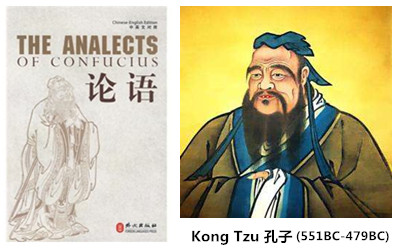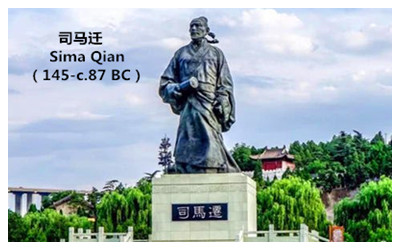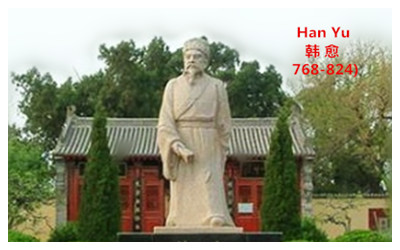Skype: neodalle-travel
Tel: +86 135 7447 2266
E-mail: sales@visitaroundchina.com

Prose is a narrative genre that expresses the author's true feelings and flexible writing style. With the development of the times, the concept of prose changed from broad to narrow, and was influenced by Western culture.In ancient China, prose recording historical events emerged along with the development of language during the Yin and Shang dynasties. It reached its peak in the Tang and Song Dynasties.
In the Zhou Dynasty
In the Zhou Dynasty, official historians recorded many historical facts about various kingdoms in simple and concise language. Later, the historical recordings were developed intohistorical literature, which recounted the realities of the period indescriptive language, including Master Zuo's Spring and Autumn Annals,Discourse of the States and intrigues of the Warring States.
(1) Master Zuo' s Spring and Autumn Annals
Master Zuo' s Spring and Autumn Annals is said to be written by Zuo Qiuming, an official historian of the Lu Kingdom at the end of Spring and Autumn Period.Master Zuo's Spring and Autumn Annals has 180,000 words and recorded the political, military and diplomatic activities and speeches, as well as divinatory practices, of various kingdoms during the 240 years of the Spring and Autumn Period. The narration in this book is dramatic and the plots compact, with the description of wars being especially effective.The language in intrigues of the Warring States is Succinct and figurative.
(2) Discourse of the States
Discourse of the States is a history of individual kingdoms. It recorded historical facts of the Zhou Dynasty and its subject kingdoms between1000 BC to 400 BC. There are more speeches than actual events in this book, which are mostly by some farsighted and liberal noblemen of thetime.
(3) Intrigues of the Warring States
The author of intrigues of the Warring States is unknown. The editionextant today was compiled by Liu Xiang of the Western Han Dynasty. It isalso the history of individual kingdoms, documenting the events of Western and Eastern Zhou dynasties and their subject kingdoms, including Qin, Qi, Chu, and Zhao. The contents is made up of mostly the proposalsand activities of counselors. intrigues of the Warring States is accomplished in narration and uses many metaphors. The characterizationin this book is very accomplished.
In the Spring andAutumn Period & Qin Dynasty
 Pre-Qin historical prose established the foundation for Chinese historical literature and exerted great influence on historians and writersof classical literature.
Pre-Qin historical prose established the foundation for Chinese historical literature and exerted great influence on historians and writersof classical literature.
It was a time of great social changes at the end of the Spring and Autumn Period and the beginning of the Warring States Period. Many schools of thought contended with each other and their works further promoted the development of rational prose. Major schools of thought at the time included the Confucian School, the Mohist School, the Taoist School, the Legalist School, among many others. And their representative works are respectively, Analects and Mencius, Sun Tzu, Mozi Zhuangzi and Hanfei Zi
In the Han Dynasty
Pre-Qin prose exerted great influence, in terms of both content andform on the development of prose in later ages. At the beginning of the Han Dynasty, political prose made a lot of advances.
Jia Yi (200-168 BC) was a great man of letters in the early stages of the Western Han Dynasty. His "On the Faults of Qin" made conclusions on the reason for the demise of the Qin, drew lessons from the peasant uprising of the late Qin and developed the idea of "relyingon the people," which became prevalent in the pre-Qin period. Jia Yi'sprose uses many metaphors and is written in figurative language.
Besides Jia Yi, many writers of the early Han Dynasty also wrote proseeither commenting on the Qin Dynasty's success and failure or puttingfotward their own assertions regarding the facts, with Chao Cuo and Zou Yangcheng's writings being the most exemplary. Chao Cuo's articles "Onthe importance of Developing Agriculture in the Frontier" and "On theimportance of Grain Production," advocated the storage of ample foodfor the defense of the border.
 During Emperor Wu's reign in the Western Han Dynasty, he advocated"banning all ideas except Confucianism." But the feudal dynasty needed to give an explanation for uniting all thinking under Confucianism basedon the end development of ancient culture. Sima Qian's Records of the Historian emerged out of the necessary historical conditions, which furtherdeveloped pre-Qin prose. Under the influence of Records of the Historian,much historical prose was created in the Eastern Han Dynasty, best represented by Ban Gu's Chronicles of the Han Dynasty.
During Emperor Wu's reign in the Western Han Dynasty, he advocated"banning all ideas except Confucianism." But the feudal dynasty needed to give an explanation for uniting all thinking under Confucianism basedon the end development of ancient culture. Sima Qian's Records of the Historian emerged out of the necessary historical conditions, which furtherdeveloped pre-Qin prose. Under the influence of Records of the Historian,much historical prose was created in the Eastern Han Dynasty, best represented by Ban Gu's Chronicles of the Han Dynasty.
During the Han Dynasty a new style, fu (赋), emerged. The name fuoriginated from the article "Fu Pian" written by Xun Qing of the Zhao Kingdom in the Warring States Period. Later, fu was designated a formalstyle. Fu is very particular in its literary grace and cadence, and possesses qualities of both poetry and prose. Famous fu of the Han Dynasty included:Jia Yi's "Lament for Qu Yuan" and "Ode to the Roc," and Sima Xiangru's(179-118 BC) "Master Void" and "Shanglin," from the early Western HanDynasty; Yang Xiong's (53-18BC) "On Sweet Spring," "On the PlumeHunt," "Ode to Changyang" and "Ode to Hedong," and Ban Gu's "Odeto the Two Capitals," from the late Western Han Dynasty; and Zhang Heng's (AD 78-139) "Ode to Two Capitals" written in the Eastern Han Dynasty. During the period of the Wei,Jin and Northern and Southern dynasties pianwen(骈文) (rhyming prose characterized by parallelism and ornateness) prevailed and prose declined. But Li Daoyuan's Commentary on the Waterways Classics and Yang Xuanzhi's Temples and Monasteries in Luoyang, both scholarly works, still contained beautiful, unaffected narration, expression and landscape description.
In the Tang & Song Dynasties
 Han Yu of the Tang Dynasty vigorously opposed the affected pianwen and advocated classical prose. Many writers followed Han's call andbegan to create classical style prose. Later Han Yu's call for classical prose creation received further support from Liu Zongyuan and thus gained even wider influence. For a time, classical prose dominated literary creativity, in what came to be called the Revival of Classical Prose in Chinese literary history. The success of the Revival of Classical Prose ledby Han Yu and Liu Zongyuan established a new style of writing whichdiscarded the conventional pattern of pianwen and gave full play to free expression, hence greatly promoting prose's functions of expression,narration, commentary and satire.
Han Yu of the Tang Dynasty vigorously opposed the affected pianwen and advocated classical prose. Many writers followed Han's call andbegan to create classical style prose. Later Han Yu's call for classical prose creation received further support from Liu Zongyuan and thus gained even wider influence. For a time, classical prose dominated literary creativity, in what came to be called the Revival of Classical Prose in Chinese literary history. The success of the Revival of Classical Prose ledby Han Yu and Liu Zongyuan established a new style of writing whichdiscarded the conventional pattern of pianwen and gave full play to free expression, hence greatly promoting prose's functions of expression,narration, commentary and satire.
The Classical Revival Movement declined after the mid-Tang Dynasty,but was advocated again by Ouyang Xiu in the Song Dynasty and followedby Wang Anshi, Zeng Gong, Su Shi, Su Xun and Su Zhe, who all madegreat literary achievements under the influence of Classicism. The six writers together with Han Yu and Liu Zouyuan later came to be known asthe "Eight Great Men of Letters of the Tang And Song Dynasties."
Sima Guang, a historical writer of the Northern Song Dynasty,compiled the great work mprehensive Mirror for Aid in Government,which is of both great historical and literarry value.
Under the influence of works created in the Northern Song Dynasty, writers of the Southern Song Dynasty produced a number of excellent political prose writings, which explicitly put forward the authors' political views. Representative writers include Hu Quan, Chen Liang and Ye Shi. The emergence of large numbers of essays written in the form of sketches, such as Hong Mai's Miscellaneous Notes from the Tolerant Study and Wang Mingqing's Hui Zhu Lu, are also attributed to the influence of the Revival of Classical Prose. Zhu Xi (1130-1200) was a famous writer of ancient prose at the time, whose works are known for their rationalism.
In the Ming Dynasty
Song Lian (131O-1381) was a founding father of the Ming Dynasty. Some of his biographies possess certain realist significance, including "A Prodigy of Shaanxi," "The Biography of Wang Mian" and "The Biography of Li Yi." After the mid-Ming Dynasty seven scholars headedby Li Mengyang and He Jingming initiated the Classical Revival Movement,which was meant to free literary creation from the limitations of Cheng Yi and Zhu Xi's idealistic philosophy and the "eight-part essay" (a literary composition prescribed for the imperial civil service examinations, known for its rigidity of form and poverty of ideas). The Classical Revival Movement called for imitating pre-Qin prose. Although it played an important role in sweeping aside the literary style of the "eight-part essay,"the movement, to some degree, exceeded its proper boundaries. Later,Li Panlong, Wang Shizhen and five other scholars led another Classical Revival Movement, which again repeated the mistakes made by the previous one.
The Tang and Song School headed by Gui Youguang first stood up to oppose the Classical Revival Movement, and later it was joined by the Gong'an School, in criticizing those scholars who imitated classical writing sblindly.
Representative figures of the Gong'an School are Yuan Zongdao, YuanHongdao and Yuan Zhongdao. Yuan Hongdao (1568-1610) is the most famous of the three. The Gong'an School believed that different times have different literature, and objected to the ways the Classical Revival Movement blindly elevated ancient literature and debased current literature. Prose created by the Gong'an School broke the yoke of conventional patterns and developed its own individuality. The language in their prose is simple and plain.
Existing simultaneously with the Gong'an School was also the Jingling School, represented by Zhong Xing and Tan Yuanchun. Like the Gong'an School, the Jingling School also laid claim to expressing the natural character and intelligence of humanity.
Under the influence of the Gong'an School and the Jingling School, alarge number of short essays were created in the late Ming Dynasty, which developed traditional prose.
Zhang Dai (1597- ?) was a famous writer of short essay of that time. His essays cover a wide range of subjects,such as landscape, folk customs and practices, drama, crafts, and even Curios and toys. The language in Zhang Dai's prose is fresh, lively and figurative, as exemplified by "Mid July at West Lake" and "Watching Snowin the Huxin Pavilion." Hou Fangyu (1618-1654) was a writer of the late Ming and the early Qing Dynasty. His prose is known for its artistry, as seen in "The Story ofLi Ji," "Actor Ma" and "The Biography of Ren Yuansui."
In the Qing Dynsty
Famous prose writers in the early Qing Dynasty include Wang Youding and Wei xi. Wang Youding (1599-1661 ) was good at writing legendaryprose, such as "The Biography of Li Yizu" and "Records of Tang Pipa." Wei Xi (1624-1680) excelled at writing biography, with his most famouswork being "Big iron Cone."
Kang Youwei and Liang Qichao were representative figures of the late Qing Dynasty, who called for reforming literature. They disregarded traditional literary forms and expressed their views frankly in their writings.Their essays were actually effective weapons in political struggles. Liang Qichao's new style of prose attacked traditional classical prose even more fiercely, which paved the way for the liberation of literary style and the birth of vernacular writings in the May 4th Movement. His "A Discourseon Youthful China" belongs to this category.
By the end of the Qing Dynasty, along with criticism of feudal and classical-style literature, emergednew forms of literature including argumentation, which is the fountainheadof modern prose.
 Ask Questions ?
Ask Questions ?